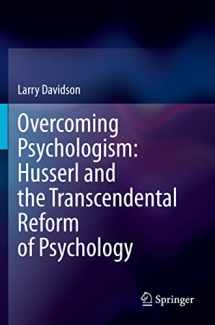
Overcoming Psychologism: Husserl and the Transcendental Reform of Psychology
Book details
Summary
Description
This book shows us how rather than abandoning psychology once he liberated phenomenology from the psychologism of the philosophy of arithmetic, Edmund Husserl remained concerned with the ways in which phenomenology held important implications for a radical reform of psychology throughout his intellectual career. The author fleshes out what such a radical reform actually entails, and proposes that it can only be accomplished by following the trail of the transcendental reduction described in Husserl’s later works. In order to appreciate the need for the transcendental even for psychology, the book tracks Husserl’s thinking on the nature of this relationship between phenomenology as a philosophy and psychology as a positive science as it evolved over time.
The text covers Husserl’s definition of phenomenology as “descriptive psychology” in the Logical Investigations, rejecting the hybrid form of “phenomenological psychology” described in the lectures by that name, and ends with his proposal for a “fundamental refashioning” of psychology by situating it within the transcendental framework of The Crisis of European Sciences and Transcendental Phenomenology.
The Author argues for a re-grounding of psychology by virtue of a “return to positivity” after having performed the reduction to transcendental intersubjectivity. What results is a phenomenological approach to a transcendentally-grounded psychology which, while having returned to the life-world, no longer remains transcendentally naïve. A phenomenologically-grounded psychology thus empowers researchers, clinicians, and clients alike to engage in social actions that move the world closer to achieving social justice for all. This text appeals to students and researchers working in phenomenology and psychology.
From the Back Cover
This book shows us how rather than abandoning psychology once he liberated phenomenology from the psychologism of the philosophy of arithmetic, Edmund Husserl remained concerned with the ways in which phenomenology held important implications for a radical reform of psychology throughout his intellectual career. The author fleshes out what such a radical reform actually entails, and proposes that it can only be accomplished by following the trail of the transcendental reduction described in Husserl’s later works. In order to appreciate the need for the transcendental even for psychology, the book tracks Husserl’s thinking on the nature of this relationship between phenomenology as a philosophy and psychology as a positive science as it evolved over time.
The text covers Husserl’s definition of phenomenology as “descriptive psychology” in the Logical Investigations, rejecting the hybrid form of “phenomenological psychology” described in the lectures by that name, and ends with his proposal for a “fundamental refashioning” of psychology by situating it within the transcendental framework of The Crisis of European Sciences and Transcendental Phenomenology.
The Author argues for a re-grounding of psychology by virtue of a “return to positivity” after having performed the reduction to transcendental intersubjectivity. What results is a phenomenological approach to a transcendentally-grounded psychology which, while having returned to the life-world, no longer remains transcendentally naïve. A phenomenologically-grounded psychology thus empowers researchers, clinicians, and clients alike to engage in social actions that move the world closer to achieving social justice for all. This text appeals to students and researchers working in phenomenology and psychology.


We would LOVE it if you could help us and other readers by reviewing the book
Book review



